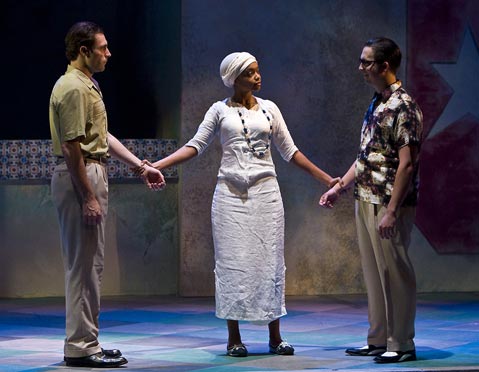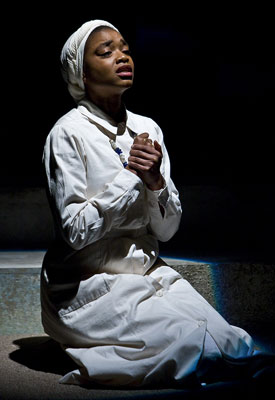La Ni±era: The Nursemaid at UCSB
BFA Students Perform Barbara Lebow's New Historical Play on May 16

Barbara Lebow’s new historical play could not be more timely, coming as it does on the eve of a decades-in-the-making rapprochement between the United States and Cuba. The Nursemaid makes a kind of temporal mosaic out of nearly a century of Cuban and American history, hop-scotching through the Castro revolution into the present day, with important stops in the early 20th century and a center of gravity that occupies the heart of the modern Cuban conflict, from 1956 to 1961. The characters for the most part belong to one or the other of two families-the Abelovs and the Martinezes-united by their grandparents’ joint venture in shoe manufacturing and sales, and divided by the politics of race and revolution.

The structure of The Nursemaid requires that all of the principal players-with the exception of Qualiema Green in the title role of Pilar-must double up, playing different characters in the show’s different timeframes. Perhaps inevitably, the initial portrayals set in the revolutionary era wind up being the most memorable. For instance, Joelle Golda shines as Rebecca Abelov when she is asked to compete with her younger sister for the attention of the handsome and charismatic best family friend Quique Martinez (Charlie Faith). Rebecca’s subsequent attachment to the dark-skinned revolutionary Luis Avila (Dakotah Brown) comes as no surprise, but the giddy New Year’s Eve celebration and the exuberant dancing that bring them together are pleasurable nonetheless. As Sara Abelov/Courtney Martinez, Amanda Berning is a marvelous ingenue, twirling her Cuban skirts one moment, and reacting painfully to the increasing conflicts in her life the next.
Of the men, Matthew Horn is the standout, giving both Alejandro “Ale” Abelov and patriarch Noach Abelov remarkable credibility and verve. When Ale flirts with danger by joining in the revolutionary planning, the play reaches one of several dramatic climaxes in a tense jail scene with Ale and his father, played by David Santana. We’ve been here before, yet there is something fresh to this version-a combination of historical veracity and sophisticated feeling for the heritage and communication style of this specific family.
Qualiema Green is given the opportunity to bring it all together at the end with a sweeping speech, but the most unifying aspect of this work remains the fascinating setting: an urban neighborhood known as “El Vedado” that was the height of fashion and a center of cosmopolitan Jewish culture in the years leading up to the revolution. Director Risa Brainin and her talented cast are to be congratulated for shining light on this modern treasure.



